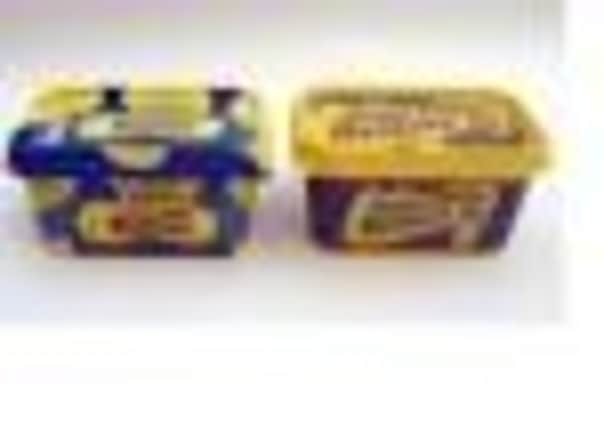Regulation call to clamp down on ‘copycat’ supermarket products


Sainsbury’s, Tesco and Boots are among the companies identified for creating own brands which mimic the style, packaging and sometimes the names of more well known products.
The British Brands Group (BBG) claims there has been a 60 per cent increase in the past year of “parasitic” brands which bear a close resemblance to a better known brand.
Advertisement
Hide AdAdvertisement
Hide AdAmong the examples cited is Tesco shampoo range mySenses, which closely resembles Clairol’s Herbal Essences and Beautifully Butterfully, which is packaged in a way similar to Utterly Butterly.
A kind of muesli produced by Sainsbury’s is sold in a buff coloured box very similar to those used to contain Dorset Cereals.
BBG director John Noble said: “The examples are too similar to have been designed by accident.
“Shoppers are likely to be misled and certainly the distinctiveness of the brand is destroyed. This is a long running sore in the UK, affecting companies of all sizes in many sectors.
The rules designed to protect consumers are just not being enforced, while brand owners do not have effective tools to prevent the practice themselves.”
Other examples include Boots, which sells a brand of moisturiser with a package similar to L’Oreal Revitalift and a relaxing bath soak with packaging with a close resemblance to Radox. .
The green and orange packaging of Berocca fizzy vitamins is echoed both in the Tesco brand B-Active and the Vitamin Store product Energy Release.
The BBG has called for the government to do more to protect manufacturers, saying existing legislation and enforcement by Trading Standards Officers is too weak.
Advertisement
Hide AdAdvertisement
Hide AdMr Noble said: “It is easy to tell the products apart in the cold light of day but the similarity in a shopping environment certainly leads to mistaken purchase.
“The bigger issue however is the belief engendered that the products have the same origin, quality and reputation as the original.” According to research by BBG in 2009, 64 per cent of people believe similar packaging can be confusing, 38 per cent believe they have been misled by lookalike brands and 33 per cent say they have bought the wrong product by mistake. Adam Leyland, editor of trade publication The Grocer, said: “This is a matter of huge concern to British manufacturers and there have been some well-known instances of manufacturers fighting back.”
He said drinks giant Diageo successfully took action against Sainsbury’s for its own brand Pitchers – because of a similarity to Pimms. The group also forced the makers of Vodkat to rebrand – arguing that customers could confuse it with Smirnoff.
Campbell Newell, a patent and trademark specialist at Marks and Clerk, said he believed the law did provide adequate power to protect manufacturers against copyright and trademark infringement.
But he said manufacturers needed to familiarise themselves with the steps they could take to protect their branding, packaging and product design.
“The legal situation in terms of trademarks has been in place for a long time now and is very effective. It is just a question of companies making sure they are protected.”
A spokesman for Sainsbury’s said the product mentioned in the report was to be relaunched in June in different packaging.